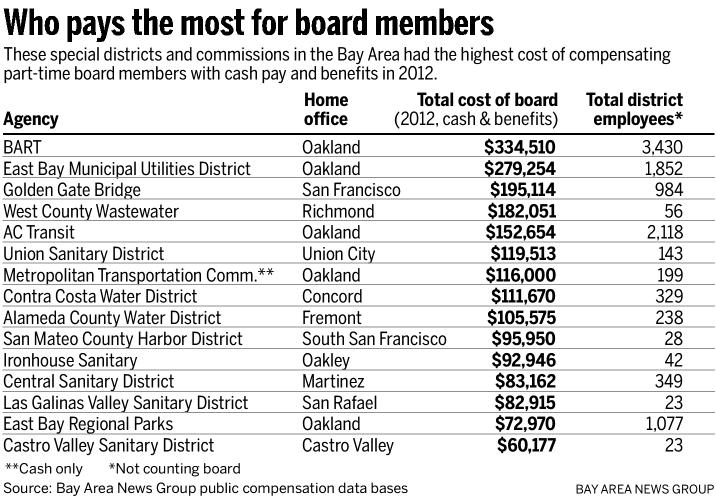A harbor commissioner in the Bay Area makes nearly $1,100 an hour and a seat on the local sewer board will net nearly $600 an hour, when salary and benefits associated with the position are weighed against the hours necessary to complete the job.
Reporter Thomas Peele writes that running for one of these positions in lesser-known local agencies “won’t make you a household name in politics, but it could make you a five-figure salary-and-benefit package for very limited work.”
The Bay Area alone is home to over 200 of these special districts, which oversees operations in everything from recreation leagues to cemeteries.
In 2012, one San Mateo County Harbor Commissioner received over $25,000 in cash and benefit compensation for attending 21 meeting that lasted on average just 77 minutes each. According to the analysis, that amounts to almost $1,100 an hour.
Mercury News analyzed pay and benefits data for over 300 Bay Area government agencies. The analysis found that almost 94% of part-time board members were paid in 2012 and that one in five received medical coverage from the district they represented.
According to the 2007 State Senate report, more than 3,400 of these agencies exist in California.
San Mateo County Harbor Commissioner Sally Campbell serves as one particularly egregious example of just how much taxpayers foot the bill for these little-known local elected leaders.
Campbell died in her 20th year in office but her grandson will continue to collect health insurance benefits to the tune of $100,000 until his 26th birthday since she listed him as a dependent on the policy.
“Do I think that’s good public policy? No, I don’t,” said San Mateo County Harbor Commissioner Robert Bernardo to the Contra Costa Times. “But that benefit was grandfathered into her package. When she died it became a promise that we have to keep.”
Others aren’t so convinced.
“If that’s not milking the system, I don’t know what is,” said Jon Coupal, president of the Howard Jarvis Taxpayers Association. “It’s mind-boggling. Anywhere else they’d get $100 a meeting and that’s it.”
Read the full article at the Contra Costa Times.





